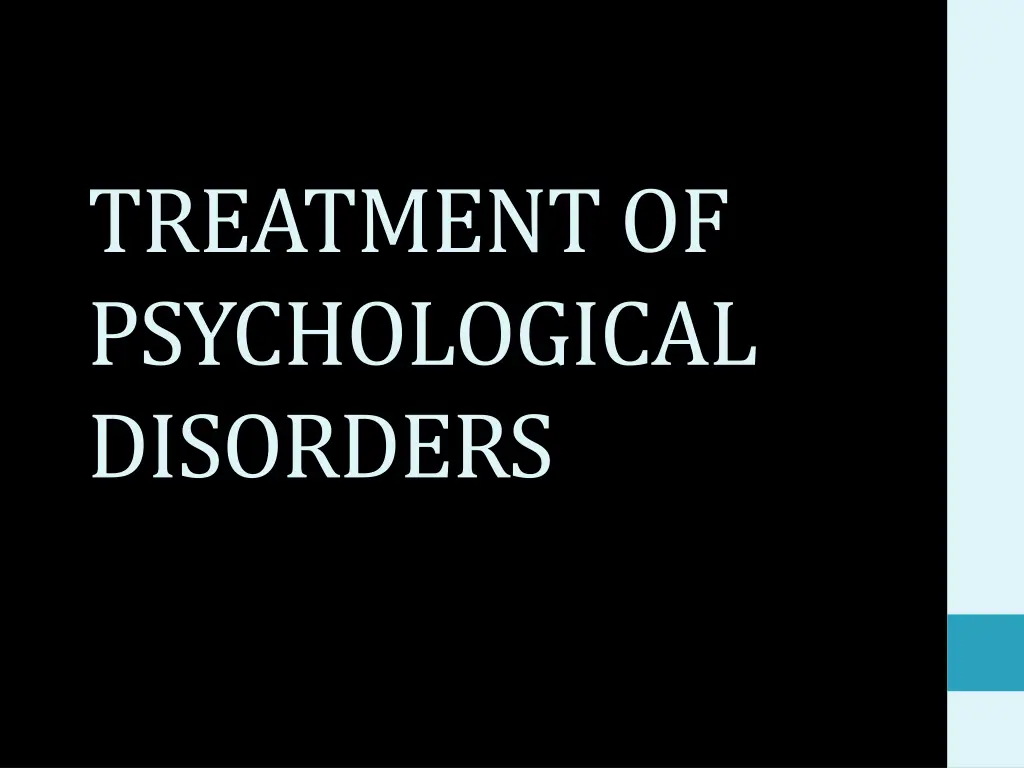
Understanding Treatment of Psychological Disorders
Explore the various types of treatments for psychological disorders, including insight therapies, behavior therapies, and biomedical therapies. Learn about who seeks therapy, who provides professional treatment, and the role of different mental health professionals in the field. Gain insights into insight therapies and psychoanalysis as part of psychological treatment approaches.
Download Presentation

Please find below an Image/Link to download the presentation.
The content on the website is provided AS IS for your information and personal use only. It may not be sold, licensed, or shared on other websites without obtaining consent from the author. If you encounter any issues during the download, it is possible that the publisher has removed the file from their server.
You are allowed to download the files provided on this website for personal or commercial use, subject to the condition that they are used lawfully. All files are the property of their respective owners.
The content on the website is provided AS IS for your information and personal use only. It may not be sold, licensed, or shared on other websites without obtaining consent from the author.
E N D
Presentation Transcript
TREATMENT OF PSYCHOLOGICAL DISORDERS
HOW MANY TYPES OF TREATMENTS? 3 major categories: 1) Insight therapies: talk therapy 2) Behavior therapies: based on principle of learning; procedures involve classical/operant conditioning, and observational learning 3) Biomedical therapies: drug therapy, shock therapy
WHO SEEKS THERAPY? C. 15% of U.S. pop. use mental health services in a given year Most common issues: excessive anxiety and depression Over half of clients do not have a specific disorder
WHO SEEKS THERAPY? Women more likely than men to receive therapy Lack of health insurance coverage is main reason for people not seeking treatment
WHO PROVIDES PROFESSIONAL TREATMENT? Clinical and counseling psychologists: specialize in the diagnosis and treatment of psych disorders and everyday behavioral problems Clinical treat full disorders; counseling treat more everyday issues
WHO PROVIDES PROFESSIONAL TREATMENT? Psychiatrists are physicians who specialize in the diagnosis and treatment of psychological disorders Mostly deal with severe disorders Have an M.D. Usually emphasize drug therapy
OTHER MENTAL HEALTH PROFESSIONALS Clinical social workers and psychiatric nurses aid psychs and psychiatrists Nurses help in inpatient treatment Social workers help patients integrate back into the community School counselors
INSIGHT THERAPIES Involve verbal interactions intended to enhance clients self- knowledge and thus promote healthful changes in personality and behavior
PSYCHOANALYSIS DEF: emphasizes the recovery of unconscious conflicts, motives, and defenses through techniques such as free association and transference
PSYCHOANALYSIS Freud treated mostly disorders called neuroses Believed problems are caused by unconscious conflicts Id, Ego, Superego fight over sexual and aggressive tendencies Help to create defense mechanisms
PROBING THE UNCONSCIOUS Free association: clients spontaneously express their thoughts and feelings exactly as they occur, w/little censorship Dream analysis: therapist interprets symbolic meaning of client s dreams
INTERPRETATION DEF: the therapists attempts to explain the inner significance of the client s thoughts, feelings, memories, and behaviors Gradual process
RESISTANCE DEF: largely unconscious defensive maneuvers intended to hinder the progress of therapy Show up late for sessions, pretend, hostile toward therapist
TRANSFERENCE DEF: when clients unconsciously start relating to their therapist in ways that mimic critical relationships in their lives They transfer their issue onto the therapist Encouraged in psychoanalysis
CLIENT-CENTERED THERAPY DEF: insight therapy that emphasizes providing a supportive emotional climate for clients, who play a major role in determining the pace and direction of their therapy Foster self-acceptance and personal growth
THERAPEUTIC CLIMATE How to create a supportive environment: 1) Genuineness: don t be phony 2) Unconditional positive regard: provide warmth and caring 3) Empathy: understanding
THERAPEUTIC PROCESS Therapist key task is providing clarification Therapists mirror client statements with enhanced clarity
COGNITIVE THERAPY DEF: insight therapy that emphasizes recognizing and changing negative thoughts and maladaptive beliefs Originally devised for depression
GOALS AND TECHNIQUES Goal: change the way a client thinks Help client use more reasonable evaluation process 4-20 sessions May argue with client to persuade
KINSHIP WITH BEHAVIOR THERAPY Clients given homework assignments Cognitive therapy has been adapted for group therapy
GROUP THERAPY DEF: the simultaneous treatment of several clients Usually 4-15 people 8 is ideal Members act as therapists for one another Provide support for one another Therapist role: selecting clients, setting goals, initiating and maintaining process, protecting clients from harm Advantages: save time and money, shows participants that their issue is not unique, provides opportunity to develop social skills
EVALUATING INSIGHT THERAPIES 1952: Hans Eysenck reports there is no evidence that insight therapy works Said untreated neurotics get better Spontaneous remission: a recovery from a disorder that occurs w/o formal treatment SR rate for neurotics is today said to be 30-40% Recent studies show that insight therapy is very beneficial to patients
